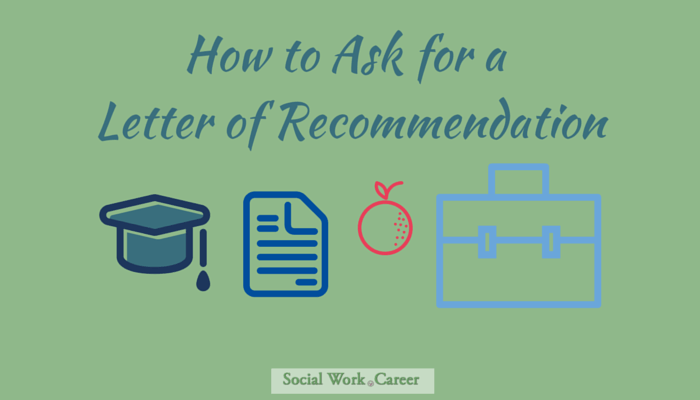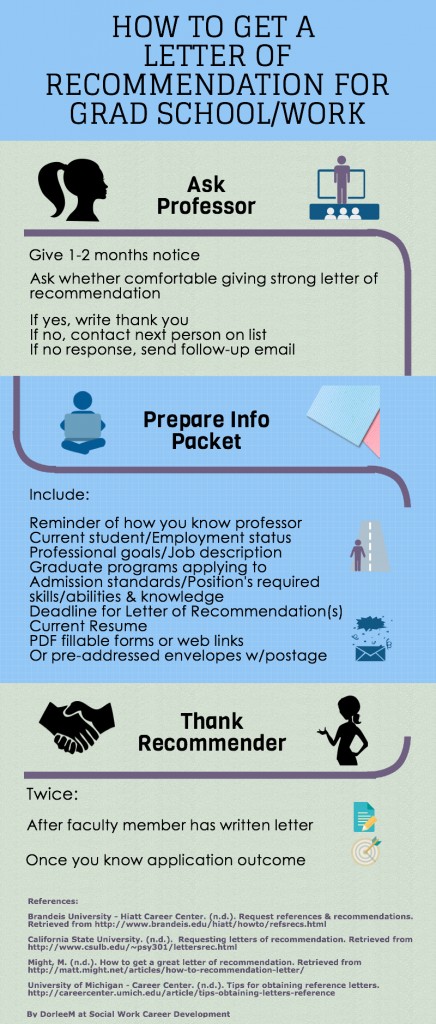Do you need a letter of recommendation from one of your professors, but have no idea of how to ask, or how to maximize your chances of getting a great letter?
Or have you already asked for a letter and been placed in the awkward position of needing to put together a reference letter draft yourself?
No worries. This post will provide you with the steps on how best to prepare to ask your professors for references, as well as give you some guidance on how to put together a draft for the professor to subsequently edit as he/she sees fit.
Ask Professor
There are those who advise only asking in person and those who say you can do this either in person or via email. Regardless of how you approach your contact, you want to:
- Be aware of deadlines for the letter submission and give recommenders between 1-2 months notice.
- Choose faculty member(s) who know you well so that they will be able to write for you both more personalized and stronger references.
- Ask politely whether he/she would be comfortable writing a strong letter of recommendation. Do they have any concerns about your candidacy as it relates to whatever you are pursuing – employment or graduate school admission?
This is particularly important if you plan to waive your right to see the letter. (Confidential letters tend to be more commonly requested by graduate school admission committees and prospective employers.)
- Do not assume that your professor will agree to write one for you. Allow one week for a response.
If response is yes, write a short thank you note.
If response is no, contact the next person on your list.
If you haven’t received a response, it is ok to contact the professor again with a follow-up email.
How to Get the Strongest Recommendation Letter:
While still in school:
- Conduct an independent study or research with the professor for one to two semesters.
And/or
- Be an engaged class student. Participate in class and/or ask professor questions after class and/or during office hours.
Too late?
- Try to connect with your faculty member by seeking graduate school or employment advice at a later point. In this manner, you will at least be a known individual before you make your request.
Prepare An Information Packet
To help the professor write a strong letter on your behalf, give him/her the following:
- A description of your current status – semester, year, planned or actual date of graduation, and current job.
- A description of your professional goals (or a copy of your application essay for graduate school or a cover letter and job description(s) of position(s) seeking).
- A description of the types of graduate programs you are applying, including admission standards, or the job description you are applying for including the position’s responsibilities, needed knowledge, skills and abilities (whenever possible, include, copies of materials from the source describing these items, or online links).
- A reminder of who you are by stating which course(s) you took, how you did and anything else that may help refresh his/her memory. Also include copies of your work with his/her grade and comments attached. Some recommenders even welcome a photo to help jog their memories if a few years have gone by since your last interaction.
- The deadline for the letter(s) [send recommender a reminder about deadline a week prior]
- Advance notice for the professor that he/she is going to get an email from an institution to which you are applying (if applicable).
- Your overall GPA and major GPA (or simply a non-official transcript).
- A list of courses you have taken in both your major and minor, and grades earned.
- Test scores you’ve received for admission to your desired graduate program (GRE, GMAT, LSAT etc) and SAT scores.
- A brief description of research experiences with different faculty members.
- The titles and abstracts of any research papers or presentations you have written.
- Honor societies to which you belong and honors/awards that you have won (or expect to receive), scholarships.
- Current resume (incl volunteer/internship experience and organizations participated in (and any offices held) relevant to professional goals).
- Any “life circumstances” information that help explain away poor GPAs or test scores.
- Any PDF fillable forms or web-links for the reference and/or addressed envelopes (preferably typed) with the return address of the faculty member [include sufficient postage].
Brevity is key. Also try to write your descriptions in a way that your referee can easily incorporate bits and pieces of what you’ve written into a letter.
Thank Recommender
Your professor spent much time and effort in writing the letter of reference on your behalf to help you get where you’d like to go next in your educational/professional life. Therefore you want to express your appreciation; it is both courteous and professional 🙂
- Thank writer after he/she has submitted letter.
- Once you’ve been admitted and/or hired for your desired position, update your reference writer with the outcome as you express your appreciation once more for his/her referral.
When you take the time to do the right thing and thank your recommender, you have the bonus of being able to ask him/her at a later point to write another letter on your behalf because you have shown respect for his/her time and worked to maintain your relationship.
What to Do When Asked to Draft Your Own Reference Letter
You may want to first seek clarification from your recommender as to whether they would like you to put together an actual letter draft, or would they prefer a list of bullet points from you that they can can incorporate into a letter.
Often, a list about your interests and accomplishments will meet their needs. If so, try to include at least one item that makes you unique as a candidate.
If, after checking, you still need to put together a letter, below is a template that I created based upon guidance provided from both Tufts University and the University of Miami School of Law that you may use to fulfill this task.
Template for Writing a Good Reference Letter
1st Paragraph
- How long has writer known candidate and in what context (as employer/instructor etc.)
- It may also confirm facts known about candidate such as current student status, dates during which recommender was your instructor or job title and role within company
- General statement regarding candidate’s abilities/suitability for graduate school/position
2-3 Body Paragraphs
- 2-3 well-explained examples (1 example per paragraph) that describes in detail 2/3 skills/qualities the reader should learn about the applicant and how it is relevant for graduate school/position.
In other words, you want to choose examples that best illustrate 2 or 3 key skills/qualities for your desired school/employment.
- Or, you can use one paragraph to describe your skills and qualities and the second and third paragraphs to provide concrete examples in which you excelled in class or in your previous job.
Conclusion
- This may begin with brief additional information (such as personality traits) and then states explicitly the level of recommendation (strongly/highly) recommend or recommend with reservations (must provide explanation), do not recommend (must provide explanation).
- Provide recommender’s contact info and end with the letter with “Sincerely.”
I’m hoping that you found the above guidance helpful.
What suggestions would you add to those mentioned?
References:
Brandeis University – Hiatt Career Center. (n.d.). Request references & recommendations. Retrieved from http://www.brandeis.edu/hiatt/howto/refsrecs.html
California State University. (n.d.). Requesting letters of recommendation. Retrieved from
http://www.csulb.edu/~psy301/lettersrec.html
Might, M. (n.d.). How to get a great letter of recommendation. Retrieved from
http://matt.might.net/articles/how-to-recommendation-letter/
Tufts University Career Center. (n.d.). Writing letters of recommendation. Retrieved from http://careers.tufts.edu/faculty/Writing_recommendations.pdf
University of Miami School of Law – Career Development Office. (2014). Sample letters of recommendation for law students and lawyers 2013-2014. Retrieved from http://www.law.miami.edu/career-development-office/pdf/2014/letters-recommendation-guide.pdf
University of Michigan – Career Center. (n.d.). Tips for obtaining reference letters.
http://careercenter.umich.edu/article/tips-obtaining-letters-reference




Dorlee, thanks for writing this post! As a BSW educator, I am frequently asked for recommendation letters from students wanting to attend graduate school or trying to get a job. Your post covers all the important steps from being an engaged student in the classroom to writing a thank you note for the recommendation. I often ask students who request a letter from me to first write a draft letter. While this does help me to offer a better recommendation (I am often unaware of volunteer work or overall GPA), I find it also gives students an opportunity to reflect on their own skills and career development to date. Many BSW students find it very challenging to write their own recommendation letter and I plan to share your post with them. It always makes my day when a student tells me that they were accepted to graduate school or that they got the job!
Laurel,
Thanks for having suggested this topic for a post! I’m so glad that you feel that this post covers everything you’d want a student approaching you for a letter of recommendation to know and/or take into account.
And how lovely that it “makes your day” when you hear back from a student that they were accepted to grad school or that they got the job they applied for 🙂
Excellent post, Dorlee. You’ve covered all the key points. One additional suggestion I would make is that if you’re asked to draft a letter yourself, ask for help from another student who knows you well, preferably someone who has been in class with you. It’s very hard to write a letter about yourself, and often people overlook qualities or accomplishments of their own.
Thanks so much for your kind feedback and great suggestion, Nancy.
Getting some input from someone who knows you well – be it a classmate (or former employer) may be of tremendous help to students who have been asked to put together a letter of recommendation draft.
This is likely to remind them of personality attributes and achievements that they take for granted (or just draw a blank on) but should not because they are part of what distinguish them vs. other applicants.
Thanks Dorlee. This is very helpful to share with students and alumni.
Thanks, Denise – I’m so glad that this is a helpful post 🙂
Dorlee,
I’m sure that this post will serve as a launching pad into the world of work or higher education for those who choose to follow this blueprint.
Two more reasons why it’s important to express gratitude to the professor:
1. It’s an opportunity to pay it forward. If the professor feels valued for his/her time, he/she is much more likely to write recommendations for other students.
2. You have an opportunity to practice some “stress undressing” when you do some techniques and feel that sense of gratitude deep within your heart.
What great “adds” from Laurel and Nancy!
Marianna,
Thanks so much for sharing your kind feedback and thoughts on this subject.
Paying it forward and reaping health/resilience benefits are indeed two more valuable rationales for expressing one’s appreciation to one’s recommender for all his/her time and effort.
Dorlee! I love this this post! It’s so practical and useful – EVERY professional eventually needs this information so I’ll be sharing it with my readers a little bit later in the year. Thank you thank you for continuing to keep us up to date with great info!
Aww, thank you, Tamara 🙂 I most appreciate you, your enthusiastic feedback as well as for your kind plan to recommend this post with your readers.
Best,
Dorlee
Dorlee – This post is very thorough and I’m sure I will use your points in the future as I’m a middle aged mom in school once again! The use of your graphics adds good visual!
How exciting, Yolanda – I’m wishing you the best of luck in school!
Your kind feedback is most appreciated 🙂